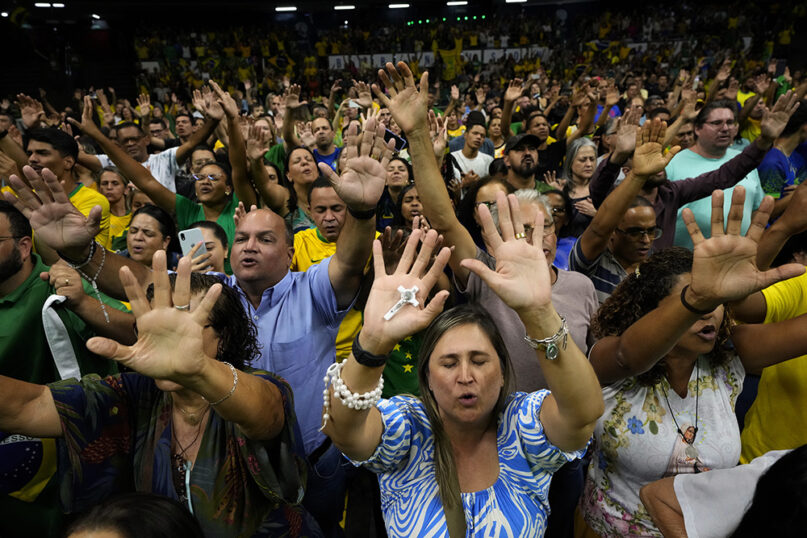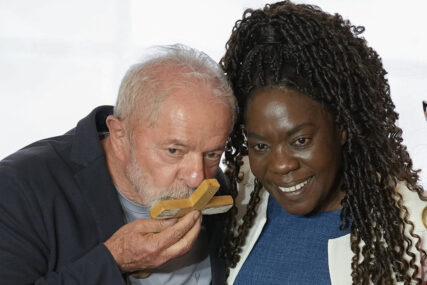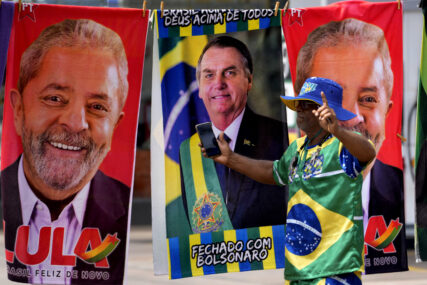Presidential standoff becomes a holy war in Brazil
The consequential presidential race in Latin America's largest country increasingly resembles religious culture-war tactics employed in US politics.

SÃO PAULO (RNS) — In Brazil on Sunday, two titans of the country will face off in a presidential runoff election that observers within the country and around the world are calling the most consequential election in decades for Latin America’s largest country.
Former two-term president and beloved icon of the working class Luiz Inácio Lula da Silva, commonly known as “Lula,” will face current incumbent president and right-wing firebrand Jair Bolsonaro after neither was able to claim a majority in the first round of the presidential elections on Oct. 2. Da Silva, who received 48% of the initial vote, has lost ground in the ensuing weeks as he works to overcome a corruption scandal that landed him in jail for more than a year. Bolsonaro, who claimed 43% of the first vote, is gaining on his opponent but faces frustration over his administration’s handling of the COVID-19 pandemic, as well as the faltering economy.
While issues surrounding the economy, high poverty rates and protection of the Amazon rainforest have been central talking points during their campaigns, both candidates have pivoted to social issues in the weeks since the first election. And the holy war rhetoric has escalated as supporters on both sides work ever harder to demonize the other.
“The biggest lie (Bolsonaro) tells each day is to evoke God all the time. He is lying. He uses the name of Jesus in vain to try to deceive the good faith of men and women,” Lula said on Sept. 4 during a meeting with housemaids at the Metalworkers Union in São Bernardo do Campo.
For his part, Bolsonaro continues to pound in a message that da Silva is connected with anti-religious Communist regimes, especially focusing on Daniel Ortega of Nicaragua.
“That criminal (da Silva) in the debate last Sunday did not mention his friend Daniel Ortega. His friend shuts down churches, arrests priests, forbids processions, does not respect religion, the same things PT (da Silva’s party) wants for Brazil,” Bolsonaro said during a rally on Oct. 18 in São Gonçalo, a city in the Rio de Janeiro metropolitan area.
While both men are Catholic, trading in spiritual language is somewhat unfamiliar for da Silva, who has always prioritized social and economic themes in his campaigns. Even so, his Workers’ Party (known as PT in Brazil) has historical ties with progressive Catholicism. Founded in 1980 by union leaders, left-wing activists and members of Catholic groups like the base ecclesial communities (known as CEBs), their efforts were inspired by the Liberation Theology movement.
But with Bolsonaro’s religious outreach looking more effective, members of da Silva’s campaign have clearly embraced a tactical change.

Brazil’s President Jair Bolsonaro speaks during a ceremony at the Planalto presidential palace, in Brasilia, Brazil, Tuesday, July 13, 2021. (AP Photo/Eraldo Peres)
Bolsonaro has long courted both evangelicals and right-wing Catholics, with an emphasis on religious freedom, anti-abortion and anti-LGBTQ issues. His wife, Michelle Bolsonaro, who is a member of a Baptist church, has been playing a fundamental role this year, making speeches during evangelical church services around the country, portraying Lula and his left-wing allies as diabolical forces that can only be defeated by Bolsonaro.
The religious attacks have been playing a central role in recent polls, according to demography expert José Eustáquio Diniz.
“Six months ago, surveys showed that Lula and Bolsonaro had almost an equal share of the evangelical vote. Now, Bolsonaro has almost 70% among them,” he said. Among Catholics, da Silva has 57% of their support, while Bolsonaro has 37%.
Marcelo Vitorino, an expert in political marketing who has led the campaign of major politicians in Brazil, told Religion News Service that “Bolsonaro has built a solid reputation among conservative Christians,” so attacks against him may not harm his image much in Christian segments.
But, Vitorino also noted, when both candidates have such a high unfavorability rate among undecided voters, a warlike campaign may lead them to just stay home on election day. “That is a real risk.”
Much of this war is being fought online, by supporters, and they are not exactly following the rules of a fair fight.
Two days before the first round, on Oct. 2, a viral video, later said by its creator to have been taken out of context, was heavily promoted by Bolsonaro supporters ahead of the first round of elections. The clip showed digital influencer Vicky Vanilla, a satanist, declaring support for Lula and predicting his victory.
“That is a spiritual war,” declared Bolsonaro ally and Congresswoman Bia Kicis, along with a link to the video on her social media.

Brazil’s former president, Luiz Inacio Lula da Silva, left, who is running for re-election, kisses a cross he received from Catholic nun Sister Rosa during a meeting with members of the Catholic Church, in Sao Paulo, Brazil, Monday, Oct. 17, 2022. Da Silva will face Brazilian President Jair Bolsonaro in a presidential runoff on Oct. 30. (AP Photo/Andre Penner)
“Aimed at dispelling the fake news, the Lula campaign created an ad with the caption ‘Lula is a Christian, share the truth.’ The second of four bullet points states ‘Lula doesn’t have a pact with the Devil nor has he ever spoken with him.” The PT has also been widely publicizing photos of da Silva with Pope Francis.
The viral video was an attempt by Bolsonaro supporters at “Lula’s literal demonization in a country that is home to the largest Pentecostal and Catholic populations on the planet,” according to Andrew Chesnut, a professor and religious studies expert at Virginia Commonwealth University.
Two days later, in a counter-attack by da Silva’s supporters, social media was flooded with pictures and videos showing Bolsonaro in Masonic lodges. Soon the phrase “Bolsonaro is not a Christian,” began to trend, overtaking references to “Lula-Satanista.”
After that, a picture appeared with Bolsonaro side by side with freemasons in front of an image of Baphomet, a divinity supposedly associated with the Knights Templar and later incorporated by occultists. That picture was later proven to be a fraud, but posts connecting Bolsonaro with satanic rituals continued to be published over the next days.
“The Brazilian left wing was unprepared for these digital attacks, and without a strategy for countering fake news and moral panic,” said Magali Cunha, a PhD in communications and the general editor of fact-checking site Coletivo Bereia.
That left a vacuum for supporters to share misinformation. Cunha, who is also a collaborator with the World Council of Churches, said the posts about Bolsonaro and the Freemasonry came from digital influencers connected to the Left — not exactly from Lula’s entourage.
“In that digital war, it makes sense, especially when it comes to winning voters who still have not made a decision,” she said.

A demonstrator dressed in the colors of the Brazilian flag performs in front of a street vendor’s towels for sale featuring Brazilian presidential candidates, current President Jair Bolsonaro, center, and former President Luiz Inacio Lula da Silva, in Brasilia, Brazil, Tuesday, Sept. 27, 2022. Nearly a dozen candidates are running in Brazil’s presidential election but only two stand a chance of reaching a runoff: former President Luiz Inacio Lula da Silva and incumbent Jair Bolsonaro. (AP Photo/Eraldo Peres)
That’s not an excuse to stoop so low, argues theologian Leonardo Boff, a public intellectual with the Latin American Liberation Theology movement and a fierce critic of Bolsonaro.
Boff argues that progressives should not use the same logic of Bolsonaro’s campaign, with “demoralization, mockery, despise for the other and fake news.”
“One should respond to those attacks with facts and truth, maintaining a civil manner. We cannot play the same game they play. We have to be coherent,” he told Religion News Service.
Bolsonaro’s campaign reacted to the freemason photos with more religious attacks. A few days later, neo-Pentecostal Pastor Damares Alves, Bolsonaro’s former minister of Women, Family and Human Rights who was elected to the Senate in the Oct. 2 election, released a video of her testimony during a church service. She graphically described a supposed network of pedophiles in Marajó Island, in the Amazon, which was trafficking Brazilian children to other countries.
In the clip, Alves said that 3- and 4-year-olds have their teeth taken out so “they won’t bite during oral sex” and that they only receive semi-solid food “so their bowels will be clear for anal sex.”
“Bolsonaro said: ‘We will get all of them.’ And hell rose against this man. The war against Bolsonaro waged by the press, waged by the Supreme Court, waged by the Congress, believe me, is not a political war. It is a spiritual war,” she continued.
Required by federal prosecutors, Alves failed to provide evidence of what she said. Analysts pointed out the similarities of her rhetoric with the U.S. Q’Anon conspiracy theory.
“In fact, it is part of the Brazilian evangelical tradition. It is based on the idea of a world dominated by evil and that only the spiritual community of the church can protect someone,” said Francisco Borba Ribeiro Neto, the director of the Pontifical Catholic University of São Paulo’s Center of Faith and Culture.
The exploitation of such ideas for electoral results, however, was imported from the United States, he argued.
To great effect, according to Chesnut.
“In the country that is arguably the epicenter of global Christianity today, it comes as little surprise that presidential candidates are compelled to prove their Christian credentials while demonizing their opponents,” he declared. “The victor of the electoral holy war will very likely be elected Brazil’s next president in the upcoming second round of elections.”
No comments:
Post a Comment